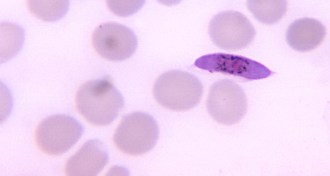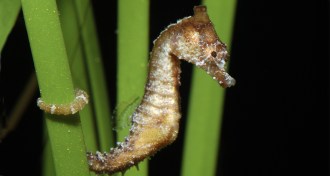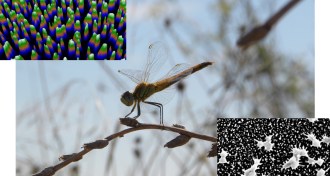Uncategorized
-
 Life
LifeTo cook up life, just add citrate
The theory that RNA spawned the first organisms gets a boost from a common compound.
By Sam Lemonick -
 Astronomy
AstronomyComet ISON approaches sun for Thanksgiving flyby
On Thanksgiving, Comet ISON will pass near the sun and may disintegrate.
-
 Planetary Science
Planetary ScienceJupiter’s Great Red Spot explained
A computer simulation is the first to explain how Jupiter’s Great Red Spot has survived for the nearly 200 years humans have observed it.
-
 Space
SpaceMaking the most of zero gravity
Astronaut and author Chris Hadfield discusses life in, and after, space.
By Andrew Grant -
 Life
LifeCompounds defeat malaria at every step
Experimental drugs are first to kill all stages of the parasite’s infection cycle.
By Beth Mole -
 Health & Medicine
Health & MedicineSimple dietary supplements could help stave off AIDS
Many people newly infected with HIV stayed healthy on regimen involving multivitamins and selenium.
By Nathan Seppa -
 Health & Medicine
Health & MedicineThalidomide treats Crohn’s disease
Study of children with the inflammatory bowel disorder raises possibility of new use for tainted drug.
By Nathan Seppa -
 Animals
AnimalsOdd head of seahorse cloaks its sneak attacks
Head shape creates hydrodynamic fake-out for stealth hunting.
By Susan Milius -
 Materials Science
Materials ScienceMaterial inspired by dragonfly wings bursts bacteria
Silicon studded with nanostructures could act as antimicrobial coating on medical devices.
By Beth Mole -
 Archaeology
ArchaeologyEarly shrine unearthed at Nepal Buddhist site
Ritual structure could help pin down when the sage known as the Buddha lived in South Asia.
By Bruce Bower -
 Climate
ClimateMethane emissions may be far higher than estimated
U.S. fossil fuel and cattle industries may emit far more methane than government estimates indicate.
-
 Health & Medicine
Health & MedicineWhooping cough vaccine may still allow some level of infection
Animal tests show pertussis shots stave off symptoms but allow spread of the bacteria.
By Nathan Seppa